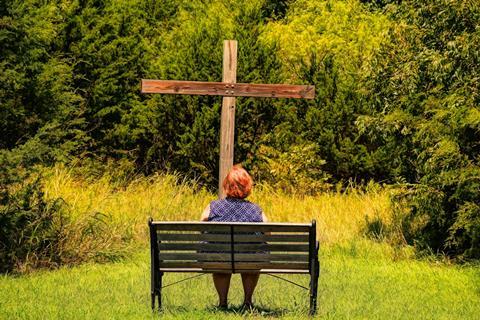Ann-Louise Graham discusses the arrest of Isabel Vaughan-Spruce for praying outside an abortion clinic, and says this case highlights the risks of criminalizing religious expression.

Last week, my home city of Birmingham became the focus of what has been dubbed the first “thought crime” case to be prosecuted in 21st century Britain. The case centres around the arrest and prosecution of Isabel Vaughan-Spruce, a Christian woman who was arrested in 2023 for silently praying outside an abortion clinic in south Birmingham.
Despite being fully acquitted at Birmingham Magistrates Court, Vaughan-Spruce was later arrested again for silently praying in the “buffer zone” outside the same clinic.
Despite being fully acquitted at Birmingham Magistrates Court, Vaughan-Spruce was later arrested again for silently praying in the ‘buffer zone’ outside the same clinic. A public spaces protection order (PSPO) enacted at the clinic prohibits prayer and other activities considered to be anti-abortion protests.
On this occasion, the police informed her that the act of prayer itself was the ‘offense,’ even though her prayer was imperceptible – she said nothing outside of her own mind - and the clinic was not even open at the time. The second set of charges were later dropped by the police, who issued an apology.
Jeremiah Igunnubole, legal counsel for the Alliance Defending Freedom (ADF) which represented Isabel Vaughan-Spruce, expressed delight that the police had acknowledged their wrongdoing. However, he stressed that up and down the country, “Christians exercising their basic rights to peaceful expression have faced criminal charges for silently praying or offering consensual conversations to women in need.”
I struggle to comprehend how a Christian woman could be arrested and questioned by police over her private thoughts
As someone who has spent a significant part of my life defending the rights of women and children around the world, I am angered, saddened, yet unsurprised by these recent events. I struggle to comprehend how a Christian woman could be arrested and questioned by police over her private thoughts. An event which caused the UK to be featured in the 2024 annual report of the United States Commission on International Religious Freedom. On page 78, of the report, the USCIRF expressed concerns over how individuals like Isabel Vaughan-Spruce could be targeted for “peaceful religious expression.”
This case not only highlights the risks of criminalizing religious expression, but it also ignores the very real need to ensure that women seeking an abortion have the right to counselling and consensual conversations before making such a significant decision. Organizations like Be Here for Me have highlighted how many women feel pressured into abortions they don’t want, leading to a lifetime of regret and personal struggles.
Read more on prayer
God answered my husband’s specific prayer requests
Prayer and fasting is the backbone behind this ministry
‘It is safe to grow old’: A prayer for letting go of your younger self
In an interview with the Christian Institute, Isabel Vaughan-Spruce said her prayers outside the clinic were for women she knows who have had abortions and later regretted their decision or had to cope with the aftermath of taking abortion pills at home. Something that highlights the truth that, in the midst of all our discussions, are the lives of a woman and her unborn child.
Sadly, the case of Isabel Vaughan-Spruce is not a one off. Soon Christian Adam Smith-Connor will appear at Poole Magistrate Court after silently praying in a ‘buffer zone’ in Bournemouth. Smith-Connor will also be represented by ADF who say they are concerned that the government is reportedly set to name silent prayer as a criminal offense. Something which, Jeremiah Igunnubole, from the ADF, claims would be “brazenly contrary to their commitment to international human rights law.”




































2 Readers' comments